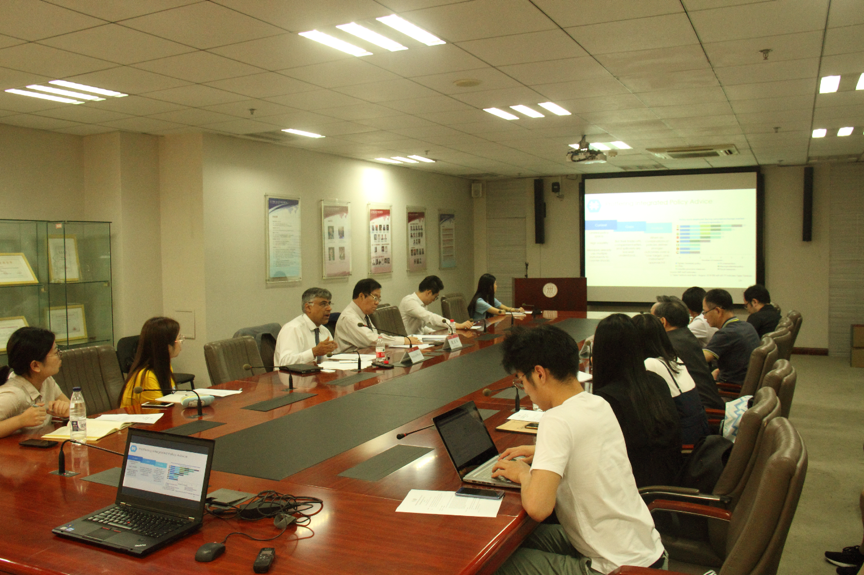Macro-Finance Salon (No. 124): Comprehensive Surveillance Review
2019-06-28 IMI Mr. Panth pointed out that the global economy is at a delicate moment. There are strains on global trade and financial integration, and traditional economic policy prescriptions are being increasingly questioned. At the same time, technological progress and demographic dividends in some parts of the world can, if harnessed properly, provide substantial boosts to economic well-being. These and other trends and uncertainties have raised the ante on IMF’s continuing importance as guardians of global economic stability.
The IMF is currently undertaking a major review to help shape surveillance to prepare for the challenges of the future. The ongoing 2020 Comprehensive Surveillance Review (CSR) will develop a strategic blueprint for IMF surveillance—one that will shape how we provide value-added to global and national policymakers over the next decade. The CSR builds on the 2018 Interim Surveillance Review (ISR), which found that Fund surveillance has adapted well to the global conjuncture and become more attuned to risks. The ISR also identified areas where further efforts would be needed, such as macro-financial surveillance and coverage in Article IV staff reports of spillover impacts from systemic countries’ policies on others. With a forward-looking perspective, the CSR will explore key global macro and financial trends, establish priorities for IMF surveillance work, and propose new ways to engage with member countries to enhance value for them. IMF policy advice will likely be anchored in a mindset of risk management, with a longer-term focus, deeper discussion on spillovers, and enhanced frameworks for dealing with macro-financial volatility that consider tradeoffs and complementarities of different policy instruments. The CSR will also coordinate closely with the 2020 Review of the Financial Sector Assessment Program (FSAP; joint with the World Bank), which is also underway. IMF Board discussion of the Comprehensive Surveillance Review (CSR) is scheduled in the Spring of 2020.
Mr. Panth pointed out that the global economy is at a delicate moment. There are strains on global trade and financial integration, and traditional economic policy prescriptions are being increasingly questioned. At the same time, technological progress and demographic dividends in some parts of the world can, if harnessed properly, provide substantial boosts to economic well-being. These and other trends and uncertainties have raised the ante on IMF’s continuing importance as guardians of global economic stability.
The IMF is currently undertaking a major review to help shape surveillance to prepare for the challenges of the future. The ongoing 2020 Comprehensive Surveillance Review (CSR) will develop a strategic blueprint for IMF surveillance—one that will shape how we provide value-added to global and national policymakers over the next decade. The CSR builds on the 2018 Interim Surveillance Review (ISR), which found that Fund surveillance has adapted well to the global conjuncture and become more attuned to risks. The ISR also identified areas where further efforts would be needed, such as macro-financial surveillance and coverage in Article IV staff reports of spillover impacts from systemic countries’ policies on others. With a forward-looking perspective, the CSR will explore key global macro and financial trends, establish priorities for IMF surveillance work, and propose new ways to engage with member countries to enhance value for them. IMF policy advice will likely be anchored in a mindset of risk management, with a longer-term focus, deeper discussion on spillovers, and enhanced frameworks for dealing with macro-financial volatility that consider tradeoffs and complementarities of different policy instruments. The CSR will also coordinate closely with the 2020 Review of the Financial Sector Assessment Program (FSAP; joint with the World Bank), which is also underway. IMF Board discussion of the Comprehensive Surveillance Review (CSR) is scheduled in the Spring of 2020.
 After his speech, the guests had a discussion on the role CSR plays in major crisis, the implication of the state capitalism under the new surveillance mechanism, the impact of financial innovation on surveillance policy, and the possible inconsistency of each country’s internal surveillance and IMF’s surveillance goals.
After his speech, the guests had a discussion on the role CSR plays in major crisis, the implication of the state capitalism under the new surveillance mechanism, the impact of financial innovation on surveillance policy, and the possible inconsistency of each country’s internal surveillance and IMF’s surveillance goals.
